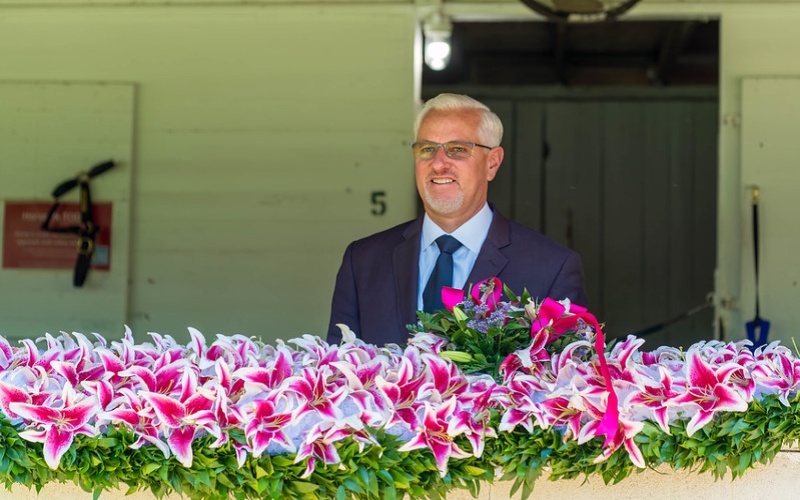Racehorses, unfortunately, do not tend to have lengthy careers.
Although they can quickly amass a fan base with racing success, there is no getting around the fact that at most, the top-tier equine athletes will have three or four years in the spotlight before retirement.
Much like coaches in team sports, however, trainers in horse racing have the opportunity to build their careers over the span of decades. This means that once in a while, a true giant in the field has the chance to emerge and reshape the game in their own image.
Todd Pletcher is one of those giants who shined in many of these racing tracks: edge.twinspires.com/racing/tracks/
The Beginning
Todd Pletcher was born on June 26, 1967 in Dallas, Texas. His father, Jake “JJ” Pletcher, a trainer in his own right, gave young Todd his first job as a hot walker (a person who walks horses to cool them off after training) at the young age of seven. When Todd was in high school, he brought his hot walking skills to other notable trainers, in particular Hall of Fame trainers D. Wayne Lukas and Charlie Whittingham.
After graduating from the University of Arizona with a Bachelor of Animal Science degree in 1989, he began training for D. Wayne Lukas’s barn. He received his own trainer’s license in December of 1995; his first official winner, Majestic Number, came home in February 1996.
Making A Name For Himself
Todd Pletcher’s first well-known horse was Invisible Ink, a horse who began life as a sickly runt but who eventually placed in the Florida Derby and the Kentucky Derby (both Grade I). That year, Pletcher also trained multiple graded stakes winners Left Bank, Balto Star, Graeme Hall, and Smok’n Frolic.
The following year, Left Bank became Pletcher’s first Eclipse Champion, being named the Top Older Male of 2002. He earned two more in 2004, taking the Three-Year-Old filly division with Kentucky Oaks- Breeders’ Cup Distaff (both Grade I) winner Ashado and the Sprint division with Grade I Breeders’ Cup Sprint winner Speightstown.
2006 was a milestone year for Pletcher; he not only set a single-season earnings record totaling $27,670,243, but he also broke his mentor Lukas’s record for stakes wins in a single year with 93. 52 of those stakes wins were at the graded level, with 17 of those being the most prestigious, Grade I.
Triple Crown races evaded Pletcher until 2007, when his Rags to Riches became the first filly in more than 100 years to claim victory in the Grade I Belmont Stakes. Three years later, Pletcher added the Kentucky Derby to his list of achievements when Super Saver won
Career Highlights
Todd Pletcher has six Triple Crown victories to his name. He won the Kentucky Derby in 2010 (Super Saver) and 2017 (Always Dreaming). He won the Belmont Stakes in 2007 (Rags to Riches), 2013 (Palace Malice), 2017 (Tapwrit), and 2022 (Mo Donegal). Oddly, for all of his illustrious achievements, the Preakness Stakes has eluded him.
The same cannot be said for the Breeders’ Cup series, where Pletcher can claim an impressive 14 victories. These include three victories apiece in the Distaff (in 2004 with Ashado, 2015 with Stopchargingmaria, and 2022 with Malathaat) and the Juvenile (in 2010 with Uncle Mo, 2012 with Shanghai Bobby, and 2022 with Forte), both at the Grade I level.
Pletcher himself also has a number of accolades to his own name. He has been named Eclipse Outstanding Trainer eight times (2004-2007, 2010, 2013, 2014, and 2022), and he has led the nation in earnings ten times (2004-2007, 2010-2015). He was named to the Racing Hall of Fame in 2021.
Controversies
No giant in the field can develop a career spanning decades without a few controversies, and Todd Pletcher is no exception.
Two of Pletcher’s most notable controversies have come to light this year, when it was discovered that two of his leading horses, Forte and Mind Control, tested positive for prohibited substances after two of their 2022 races (the Grade I Hopeful and the Parx Dirt Mile Stakes, respectively). Even more controversial than the positive results themselves was the fact that each instance was kept secret from everyone, including the racing stewards, for several months. Both horses were ultimately disqualified, and Pletcher has appealed both decisions.

